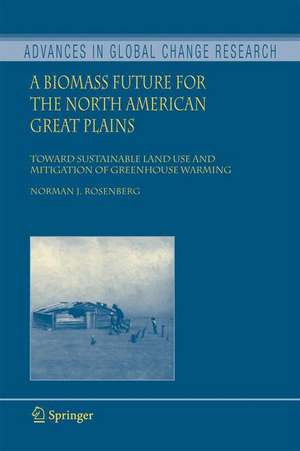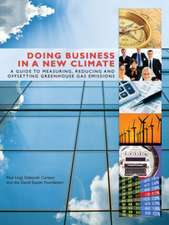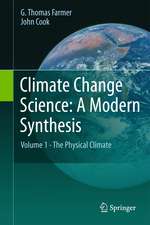A Biomass Future for the North American Great Plains: Toward Sustainable Land Use and Mitigation of Greenhouse Warming: Advances in Global Change Research, cartea 27
Autor Norman J. Rosenbergen Limba Engleză Hardback – 23 feb 2007
| Toate formatele și edițiile | Preț | Express |
|---|---|---|
| Paperback (1) | 555.53 lei 38-44 zile | |
| SPRINGER NETHERLANDS – 25 noi 2010 | 555.53 lei 38-44 zile | |
| Hardback (1) | 643.99 lei 43-57 zile | |
| SPRINGER NETHERLANDS – 23 feb 2007 | 643.99 lei 43-57 zile |
Din seria Advances in Global Change Research
- 15%
 Preț: 636.12 lei
Preț: 636.12 lei -
 Preț: 439.83 lei
Preț: 439.83 lei - 18%
 Preț: 895.45 lei
Preț: 895.45 lei - 15%
 Preț: 648.24 lei
Preț: 648.24 lei - 18%
 Preț: 1036.54 lei
Preț: 1036.54 lei - 18%
 Preț: 894.16 lei
Preț: 894.16 lei - 18%
 Preț: 963.60 lei
Preț: 963.60 lei - 18%
 Preț: 1239.49 lei
Preț: 1239.49 lei - 15%
 Preț: 649.71 lei
Preț: 649.71 lei - 18%
 Preț: 1243.78 lei
Preț: 1243.78 lei - 18%
 Preț: 1114.02 lei
Preț: 1114.02 lei - 15%
 Preț: 648.89 lei
Preț: 648.89 lei - 18%
 Preț: 960.78 lei
Preț: 960.78 lei - 15%
 Preț: 643.99 lei
Preț: 643.99 lei - 18%
 Preț: 1834.44 lei
Preț: 1834.44 lei - 15%
 Preț: 649.06 lei
Preț: 649.06 lei - 18%
 Preț: 955.70 lei
Preț: 955.70 lei - 18%
 Preț: 956.03 lei
Preț: 956.03 lei - 18%
 Preț: 1232.26 lei
Preț: 1232.26 lei - 18%
 Preț: 955.88 lei
Preț: 955.88 lei - 18%
 Preț: 959.19 lei
Preț: 959.19 lei - 18%
 Preț: 944.82 lei
Preț: 944.82 lei - 18%
 Preț: 1105.19 lei
Preț: 1105.19 lei - 15%
 Preț: 644.49 lei
Preț: 644.49 lei - 18%
 Preț: 1841.54 lei
Preț: 1841.54 lei - 18%
 Preț: 1225.94 lei
Preț: 1225.94 lei - 18%
 Preț: 954.62 lei
Preț: 954.62 lei - 5%
 Preț: 1414.80 lei
Preț: 1414.80 lei
Preț: 643.99 lei
Preț vechi: 757.63 lei
-15% Nou
Puncte Express: 966
Preț estimativ în valută:
123.27€ • 133.94$ • 103.61£
123.27€ • 133.94$ • 103.61£
Carte tipărită la comandă
Livrare economică 21 aprilie-05 mai
Preluare comenzi: 021 569.72.76
Specificații
ISBN-13: 9781402056000
ISBN-10: 1402056001
Pagini: 220
Ilustrații: XVIII, 200 p.
Dimensiuni: 155 x 235 x 19 mm
Greutate: 0.52 kg
Ediția:2007
Editura: SPRINGER NETHERLANDS
Colecția Springer
Seria Advances in Global Change Research
Locul publicării:Dordrecht, Netherlands
ISBN-10: 1402056001
Pagini: 220
Ilustrații: XVIII, 200 p.
Dimensiuni: 155 x 235 x 19 mm
Greutate: 0.52 kg
Ediția:2007
Editura: SPRINGER NETHERLANDS
Colecția Springer
Seria Advances in Global Change Research
Locul publicării:Dordrecht, Netherlands
Public țintă
ResearchCuprins
The Physical Environment.- People and the Economy.- Agriculture and Sustainability.- The Wildcard of Climate Change.- A Role for the Plains in Combating Climate Change.- Outlook.
Recenzii
From the reviews:
"In A Biomass Future for the North American Great Plains, Norman Rosenberg, an agricultural meteorologist with degrees in soil physics and meteorology, sets out to examine the potential for the North American Great Plains as a major source of biomass for producing cellulosic ethanol. … This book presents a comprehensive, thoroughly researched, and timely treatment of the topic. … The book is appropriate for upper-level students and other individuals interested in sustainable agriculture, agroecology, bioenergy, and related topics." (Steven L. Fales, Great Plains Research, Vol. 19 (1), Spring, 2009)
"In A Biomass Future for the North American Great Plains, Norman Rosenberg, an agricultural meteorologist with degrees in soil physics and meteorology, sets out to examine the potential for the North American Great Plains as a major source of biomass for producing cellulosic ethanol. … This book presents a comprehensive, thoroughly researched, and timely treatment of the topic. … The book is appropriate for upper-level students and other individuals interested in sustainable agriculture, agroecology, bioenergy, and related topics." (Steven L. Fales, Great Plains Research, Vol. 19 (1), Spring, 2009)
Notă biografică
The author is Regent's Professor Emeritus of Agricultural Meteorology at the University of Nebraska-Lincoln and Laboratory Fellow Emeritus at the Joint Global Change Research Institute, a collaboration of the Pacific Northwest National Laboratory and the University of Maryland-College Park.
Textul de pe ultima copertă
The Great Plains of North America is a major global breadbasket but its agriculture is stressed by drought, heat spells, damaging winds, soil erosion and declining ground water resources. The great inter-annual variability in crop production and declining rural populations weaken an economy already highly dependent upon government support. The region’s ecological fragility and economic weakness is attributed by many to removal of its original grass cover. Abandonment of agricultural cropping and restoration of the grass cover is one proposed solution to the region’s problems.
Simulation models suggest that the agriculture and water resources of the Plains may be stressed even further as its climate changes because of global warming, which is due primarily to the emissions of greenhouse gases from fossil fuel combustion. This book explores the possibility that the ecology and economy of the Plains region (and similar regions) would benefit from the introduction of perennial biomass crops. Biomass production and processing on the Plains (possibly aided by genetic engineering) would partially restore a perennial vegetative cover and create new employment opportunities. Biomass also offers a means of reducing fossil fuel use, providing fuel to local power plants and a feedstock for production of cellulosic ethanol, a gasoline substitute. Interest in biofuels is growing rapidly in public, political and business circles with rising fossil fuel prices and because of a growing recognition of the need for energy independence in petroleum importing countries.
Simulation models suggest that the agriculture and water resources of the Plains may be stressed even further as its climate changes because of global warming, which is due primarily to the emissions of greenhouse gases from fossil fuel combustion. This book explores the possibility that the ecology and economy of the Plains region (and similar regions) would benefit from the introduction of perennial biomass crops. Biomass production and processing on the Plains (possibly aided by genetic engineering) would partially restore a perennial vegetative cover and create new employment opportunities. Biomass also offers a means of reducing fossil fuel use, providing fuel to local power plants and a feedstock for production of cellulosic ethanol, a gasoline substitute. Interest in biofuels is growing rapidly in public, political and business circles with rising fossil fuel prices and because of a growing recognition of the need for energy independence in petroleum importing countries.
Caracteristici
Deals with an assessment of the sustainability of agriculture and water resources on the Plains and their vulnerability to climate change Includes 'primers' on climate, soils and vegetation, and on global warming and climatic change The role of biomass production in maintaining productivity of the land and improving the region’s economy Contribution that biomass can make to mitigation of global warming







